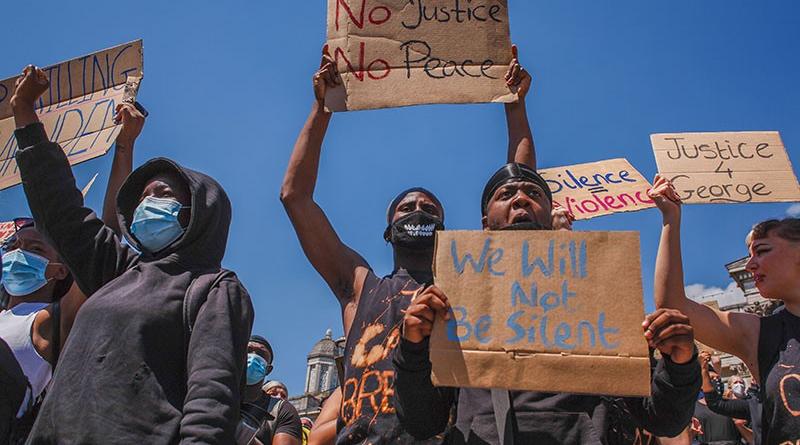Thousands of scientists worldwide to go on strike for Black lives.

Academics and some scientific organizations will stop research activities on 10 June to reflect and take action on systemic inequalities in science.
Thousands of academics and major scientific organizations worldwide will stop work on 10 June as part of a global stand against anti-Black racism in science.
More than 4,000 scientists as well as societies, universities and publishers, will join a call to “Strike for Black Lives,” halting their usual work activities to learn about systemic racism in the research community and to craft ways to address inequalities. The event is being planned by two ad hoc groups of scientists using hashtags such as #Strike4BlackLives, #ShutDownSTEM and #ShutDownAcademia. Nature has pledged to join the strike as well.
“We hope that, as individuals in communities, scientists, academics, and everyone, use this day as one of many to take action for Black Lives,” says Brian Nord, an astrophysicist at the University of Chicago, Illinois, and a member of Particles for Justice, one of the groups coordinating the event.
“We recognize that our academic institutions and research collaborations — despite big talk about diversity, equity, and inclusion — have ultimately failed Black people,” says a statement by Particles for Justice, a group originally convened to oppose sexism in academia. “An academic strike is urgently needed: to hit pause, to give Black academics a break and to give others an opportunity to reflect on their own complicity in anti-Black racism in academia.”
The event comes after two weeks of demonstrations in the United States and worldwide, to memorialize the death of George Floyd and other Black Americans who have died at the hands of police. Black scientists grieved these losses and openly shared their experiences of racism in science, and many major scientific organizations published public messages of support for the Black Lives Matter movement, and against racism at large.
Global movement
Brittany Kamai, a physicist at University of California, Santa Cruz, and the California Institute of Technology in Pasadena, thought up the idea for the shutting down academic work last Monday, and emailed a group of friends, who supported it. These included Chanda Prescod-Weinstein, a cosmologist at the University of New Hampshire in Durham who is part of Particles For Justice, and Yilen Gómez Maqueo Chew, an astrophysicist at the National Autonomous University of Mexico in Mexico City, who both helped promote the event. Prescod-Weinstein and Nord had been considering the idea of a strike already. The groups launched ShutDownStem.com on 5 June, alongside a letter and petition on ParticlesForJustice.org.
“Several other co-authors of the previous Particles for Justice statement about sexism (and racism) at CERN were enthusiastic and within a day of conception, we had a draft statement. The timeline from drafting to sending out for early support was about 2 days,” says Prescod-Weinstein.
Kamai compares the effort to flooding a road with demonstrators. “This is the digital equivalent of that highway getting shut down. The functions of our STEM world are going to stop for a day, bring awareness, so that we can start to put in the work.”
“This work of making STEM academia less racist, anti-racist, is part of our work as academics and STEM professionals. And this needs to be recognized,” says Gómez Maqueo Chew. This time for “making academia and STEM anti-racist” does not compete with research work, she said, though people from under-represented groups routinely find themselves multitasking in this way.
For some researchers, the statements from institutions made last week in support of #BlackLivesMatter didn’t go far enough. “Calls for justice and centering Black lives were met with watered-down statements promoting diversity and inclusion initiatives that have proven ineffective,” says Brian Shuve, a physicist at Harvey Mudd College in Claremont, California, and a member of Particles for Justice. “We wanted our fields and institutions to take collective action and do better.”
Although the movement began in the United States, it quickly spread around the globe. Particles for Justice has garnered pledges from people striking from every inhabited continent. Police violence “is a global issue, unfortunately”, says Nicolás Bernal, a physicist at Antonio Nariño University in Bogotá, Colombia, who will strike. During their normal particle-physics seminar on Wednesday, Bernal and his colleagues are planning to discuss how systemic racism pushes Black and Indigenous people out of science.
Publishing pause
Organizations joining the strike include the physical-sciences preprint server arXiv, which is discouraging authors from submitting manuscripts on Wednesday. Instead, it has asked its users to spend the time researching and discussing racism, and planning how to tackle it in their own communities. “arXiv is an essential, daily tool for most physicists, and Black physicists are faced with the simultaneous tasks of writing and reading papers, while also fighting for their rights,” the platform’s staff wrote in an announcement.
It wasn’t a hard decision for arXiv to join the strike, says executive director Eleonora Presani, an astroparticle physicist. “I personally hope that everyone will take this opportunity to try and understand the struggles of minorities in science, in particular, today, the struggles of Black students and Black researchers,” says Presani.
The American Association for the Advancement of Science in Washington DC, and its main journal Science, said that it would be “observing #ShutdownStem, listening to members of our community who are sharing resources and discussing ways to eliminate racism and make STEM more inclusive of Black people”. It invited its 120,000 members to join the effort.
The American Physical Society (APS), which has more than 55,000 members, and Britain’s Institute of Physics will also strike. The APS’s flagship journal, Physical Review Letters, will not publish or tweet any papers. “APS will be closed for business on Wednesday, June 10 to stand in support and solidarity with the Black community #Strike4BlackLives #ShutDownSTEM #ShutDownAcademia,” it said on Twitter.
doi: 10.1038/d41586-020-01721-x
9 June 2020
nature





